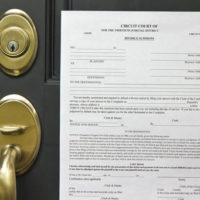Divorcing an Absentee Spouse

Dissolving a marriage is difficult enough when both parties are involved, but can become even more complicated when one of the parties cannot be located. Fortunately, it is possible to divorce an absentee spouse, although the spouse filing for divorce will face additional procedural hurdles. To ensure that you comply with all of the necessary rules for obtaining a divorce when you do not know where your spouse is living, please contact a divorce lawyer who can assist you.
Serving the Other Party
One of the basic requirements of the divorce process is that the petitioning spouse serve the other party with a copy of the divorce petition, which gives him or her notice of the suit as well as the opportunity to reply. This is a relatively simple process when the petitioning party knows where the other spouse is living, but can become difficult, if not impossible, when the non-filing spouse cannot be located.
Fortunately, in Florida, specific rules were put in place to address this problem. For example, one party can still file a petition for divorce and satisfy the notice requirement as long as he or she provides constructive notice to the other spouse. This can be achieved through what is referred to as service by publication, which involves publishing a notice of divorce in a newspaper for four consecutive weeks. As long as the petitioning spouse receives approval from the Clerk of Court and makes a diligent search for the absent party, he or she will have satisfied this requirement. However, this requires more than just stating that the other spouse cannot be found. Instead, the petitioner will need to provide evidence that he or she took one or more of the following actions:
- Contacted the absent party’s last known employer;
- Spoke with family and friends about the absent spouse’s location;
- Searched online and checked social media; and
- Monitored the other party’s bank or credit card activity.
Once the petitioning party has taken these steps, he or she must sign and submit an affidavit at the time that the petition is filed. Without this document, a court will refuse to proceed with a divorce case.
Default Judgment
When an absent spouse fails to respond to a divorce petition, the court may issue a default judgement, which essentially grants the petitioner’s demands in regards to dissolving the marriage. However, the court will not be able to resolve the following issues:
- Property division;
- Child support awards;
- The creation of a parenting plan or visitation schedule; or
- Spousal maintenance awards.
Once the missing party is found, the court will reopen the case to resolve these matters. This may not happen for months or even years, making it especially important for the petitioning spouse to make a legitimate attempt to find the other party.
Call Today to Discuss Your Case with an Experienced Divorce Lawyer
If you are considering filing for divorce, but don’t know where your spouse is currently residing, please contact Sandra Bonfiglio, P.A. at 954-945-7591 to learn more about your legal rights and obligations. Our Fort Lauderdale legal team is prepared to assist you immediately.
Resource:
jud6.org/GeneralPublic/RepresentingYourself/ApprovedForms/Package%201c%20-%20Constructive%20Service.pdf
